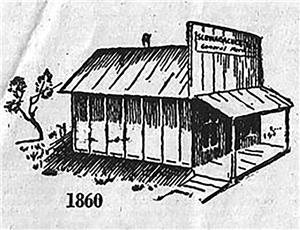In the fall of 1860, the Schwabacher brothers, including Louis (1837-1900), Sigmund (1841-1917), and Abraham (1838-1909), open a store in the small town of Walla Walla on the corner of Main and 3rd streets. Although shops had been established to supply Fort Walla Walla, the Schwabachers move to the area is intended largely to supply prospectors en route to gold mines in the eastern part of the territory. After establishing and expanding their store in Walla Walla, the brothers will extend their operations into Western Washington. The store in Walla Walla will remain in operation until 1910, when the Schwabacher family will sell its interest in it. The successor store, Gardner & Co, will remain open until 1980.
The Schwabacher Supply Chain
Between the 1830s and 1860s, a number of entrepreneurial Jewish immigrants, largely from Germany, made their way westward following the discovery of gold in California. Louis Schwabacher was among these, although he arrived in the late 1850s and quickly turned his attention to new opportunities north. He set up a general store in The Dalles, along the Oregon Trail, and sent for his brothers Abraham and Sigmund from Germany. In 1860, gold was discovered in eastern Washington Territory (now Idaho) and the Schwabachers opened a warehouse in Walla Walla and filled it with mining and other supplies from San Francisco.
Within a couple of years, the Schwabachers had built a two-story brick building -- one of the first brick structures in town -- on Main Street and out of it sold a variety of merchandize. They also built a grist mill to grind wheat for shipment to Portland. In 1869, the brothers expanded their growing network to Seattle, where the brothers built a large business selling clothing, groceries, hardware, and building materials. The Seattle enterprise was managed by Bailey Gatzert (1829-1893), who was married to Babette Schwabacher.
Prospering in Walla Walla
As Walla Walla transitioned from a mining supply center to an agricultural center, the Schwabachers' store continued to prosper. In 1876, the company built a new two-story brick building, which the local newspaper claimed was the finest building of its kind north of San Francisco. The brothers, particularly Sigmond, were active in local affairs; Sigmond served on the city council, was a director of the First National Bank, and helped raise funds for the Seattle-Walla Walla Railroad.
After achieving success in the Northwest, the Schwabacher brothers returned to San Francisco in the 1880s. Their store continued to thrive for some time, but in 1910 the Schwabacher family sold its interest in the Walla Walla store to long-time employees and stockholders H. A. Gardner and J. M. Fitzgerald. The successor store, Gardner & Co, Inc., built a new building and operated for many decades as a department store. In 1980 Gardner's store, which claimed to be the oldest in the state, closed.

